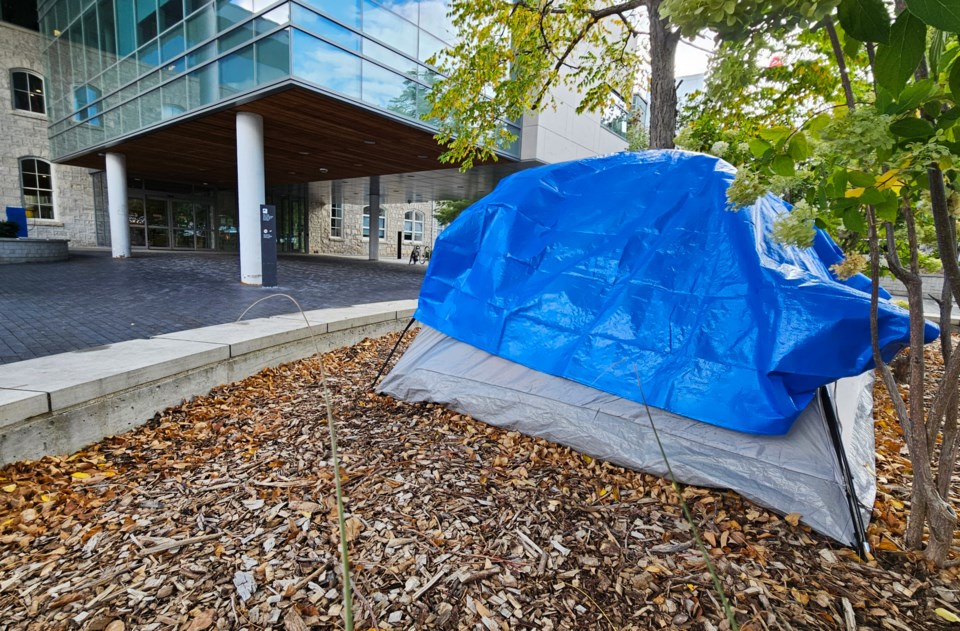There will be no city-led structured encampment site in Guelph. Instead, city council will ask county officials to review the efforts of a community group looking to establish one and consider how they can help.
Through a series of motions and amendments on Tuesday, council’s committee of the whole unanimously agreed to pass the concept of a sanctioned, temporary structured encampment on to the County of Wellington’s social services committee.
That decision comes on the heels of a city staff report advising council not to move forward with the idea because it falls outside the scope of the city’s mandate and would cause additional budget pressures.
“We need to figure something out because this is not working,” Mayor Cam Guthrie said of existing housing services, which are handled by the county on the city’s behalf. “People living in tents is not appropriate.
“There are people who are willing to do something (to help), but they’re waiting on government action.”
That same city staff report states county officials aren’t supportive of a designated encampment site, at least in part because of the cost.
City staff estimate an encampment of 50 modular units would have up-front costs of $2.5 million and ongoing operating costs estimated to be in the range of $40,000 to $50,000 per unit annually, or another $2 million to $2.5 million per year for 50 units.
The committee’s Tuesday decision isn’t final, but rather a recommendation for city council to consider. A formal council vote is expected May 28, after which, if approved, the request will be made of the county.
“That’s the folks who have the expertise,” CAO Scott Stewart told the committee. “We’re structured for them to lead us through this.”
There was general acknowledgement in the council chambers that something must be done to help unhoused residents.
“If we don’t take action, we’re still going to have this problem,” noted Coun. Leanne Caron.
“The solutions that the county has in place now are not meeting the needs,” added Coun. Erin Caton, noting some people choose to live rough rather than go to a shelter for a variety of reasons, including environmental sensitivities and a desire to stay with a loved one or pet.
Earlier this year, the County of Wellington hosted two symposiums on housing and health. County officials heard from a variety of service providers, people with lived homelessness experience and others, with stated plans to develop an action plan to address issues in the community.
However, so far nothing has been publicly announced.
Ahead of the committee’s vote, council heard from numerous delegates who urged it to take what action it can to help address homelessness-related issues, including providing support to the Guelph Tiny Homes Coalition (GTHC).
“The goal of this pilot is to help people who fall through the gaps of our system to have another option (to shelters) and then support them through the next step of their housing journey,” coalition member Mike Marcolongo told the committee. “There is a ton of goodwill in the community to make this happen.”
The GTHC proposes a community of 25 to 50 tiny homes be established, with shared kitchen, washroom and laundry areas, along with the provision of health, mental health and other wrap-around services residents may need.
It’s the GTHC effort city council wants the county to review and consider supporting.
Marcolongo challenged city staff’s cost estimates, suggesting it could be done at a lower cost with community volunteers and fundraising.
So far the coalition hasn’t identified a site location. Marcolongo acknowledged a call for interested landowners to come forward last month gained “little traction.”
Michael Keegan, who explained he has a background in government work, encouraged council to hold the county accountable. He called for a motion directing the county to “quickly” determine how to respond to the crisis and put a plan into action.
“If this isn’t the right path forward, then what is?” he asked, referring to a designated temporary structured encampment. “We all acknowledge there are gaps that need to be addressed.”
Keegan’s question was echoed in council’s last motion of the day on this issue.
If county officials decide the GTHC concept isn’t viable from their perspective, the motion requests they provide an alternative, accessible option for the joint social services committee to consider, as well as a winter plan to support people living in encampments.
